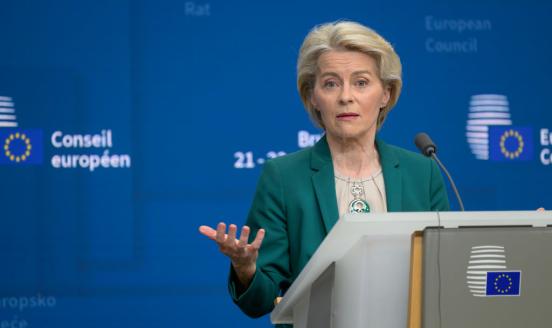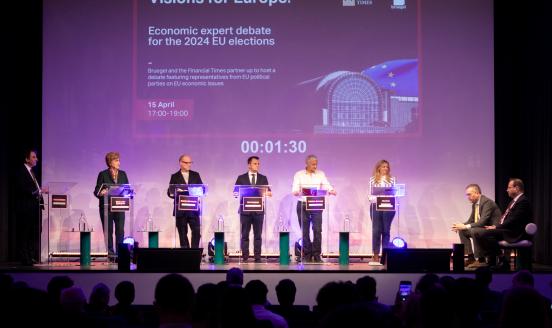Germany: what are the implications of the NRW elections?
The recent elections in North Rhine-Westphalia (NRW) on 13 May 2012 led to success for the German Social Democratic Party (SPD) and to a defeat for Merkel’s Christian Democrats (CDU). The CDU obtained a mere 26.3 % of the votes, the party’s worst ever result in this state. There is now a clear majority for a red-green government.
What does this result imply for the coalition in Berlin, and what changes will the dismissal of Norbert Röttgen, former Minister of Environment, have on the energy turnaround in German?
This blog entry summarizes what the national press and blogosphere says about it.
Which implications for the coalition?
According to the press and blogs, the NRW elections will lead to difficulties in reaching agreement on the fiscal compact, an intensification of coalition partners tensions and a re-orientation of the CDU:
According to an op-ed in the Financial Times Deutschland on 13 May 2012, the election in NRW was not a vote on Merkel’s austerity. However, the results constitute a problem for Merkel, notably in regard to the foreseen vote on the Fiscal Pact given that a two-thirds majority is needed in the Bundestag.
Also, Hannah Beitzer writes in the Süddeutsche Zeitung on 15 May 2012 that the NRW elections will have negative implications for the coalition of the CDU and the Liberal Democratic Party (FDP): they do not have the majority in the polls and their relations are tense. They disagree on numerous topics such as the energy turnaround, the care benefit, the implementation of the EU directive on data preservation, the minimum wage and tax cuts. The main problem will be the vote on the Fiscal Pact and the European Stability Mechanisms (ESM) that requires a two-thirds majority in the Bundestag and Merkel therefore needs the support of the opposition. Following the results of the NRW elections, the latter presented its conditions for this vote: adding a growth component to the Fiscal Pact and implementing the tax on financial transactions, even if not all EU Member States participate (the FDP on the other hand requires participation of all EU member states for this).
According to the Handelsblatt on 21 May 2012, the elections led to turmoil in the coalition: the discussion now focuses on whether Röttgen should give up his CDU vice post. This weekend, the coalition tried to move on and Merkel received majority support from her party. The NRW elections fiasco will give rise again to a more conservative profile of the CDU.
Michael Inacker (Handelsblatt on 18 May 2012) thinks that the decision to fire Röttgen will have a positive impact on the position of the Chancellor. She had no other choice in order to maintain her chancellorship. Once again, she stabilized her chancellorship after a critical phase. The fact, that she fired her former favourite is proof of the huge risk she was confronted with after the elections.
Which implications for the energy turnaround?
The energy turnaround is a central project of the Chancellor. According to the press, Röttgen became entangled in the ‘old’ power game between the Federal Ministry of Environment (BMU) and the Federal Ministry of Economy (BMWI) and wasted precious time. Merkel chooses her strongest man to implement this crucial project: Altmaier is known as pragmatic and professional when it comes to negotiations, due to his position as CDU chief negotiator in the Arbitration Committee.
Oliver Stock states in the Handelsblatt on 16 May 2012 that Merkel had to intervene – she could no longer watch how the Minister ‘without energy’ did not tackle the energy turnaround as he should have done. The Chancellor has only a few projects which are likely to ignite debates: the two most important are probably the debt crisis and the energy turnaround.
Bernd Zieseme writes on 21 May 2012 in the Handelsblatt that Altmaier is known in the Berlin community for his stoic calmness. Armed with this virtue, the new Minister should be capable of solving the long-lasting conflict between BMU and BMWI. That is why Merkel chose him, as she knows that solving this conflict is the only way to render the energy turnaround feasible.
The Handelsblatt on 18 May 2012 writes that Altmaier must now solve the enormous task of the energy turnaround. The pressure is high and industry wants to see results. According to the President of the German Chamber of Industry, Hans Heinrich, it is crucial to focus on the strife between BMU and BMWI. Röttgen left a lot of ‘construction sites’ in the Federal Environment Ministry. While the FDP is confident that Altmaier will soon implement the energy turnaround given his known pragmatic character, the opposition, in particular the Green Party, is skeptical.
According to Henning Krumrey, who writes on 21 May 2012 in Wirtschaftswoche on the ‘Berlin inside’ blog, Altmaier will soon have to take his first decisions. On Wednesday morning, the prime ministers of the Länder and Merkel will meet in the chancellery to make headway in the energy turnaround field. In particular, Merkel wants the Länder to accelerate the approvals for new conductors and to concede more powers to the Bund.
In Sprengsatz on 16 May 2012 underlines also the importance of the energy turnaround. Merkel chose the strongest man in her fraction to tackle it. This demonstrates how serious the situation is.
Dietmar Neuerer( Handelsblatt on 18 May 2012) observes that the dismissal provoked different reactions within the CDU: on the one hand there was harsh criticism towards Merkel’s decision, on the other hand she received support. Röttgen turned out to be an inappropriate choice given the recent criticism of energy providers, the cuts in photovoltaic subventions and the most recent decision of the Bundesrat about the reform of the law on renewables.



